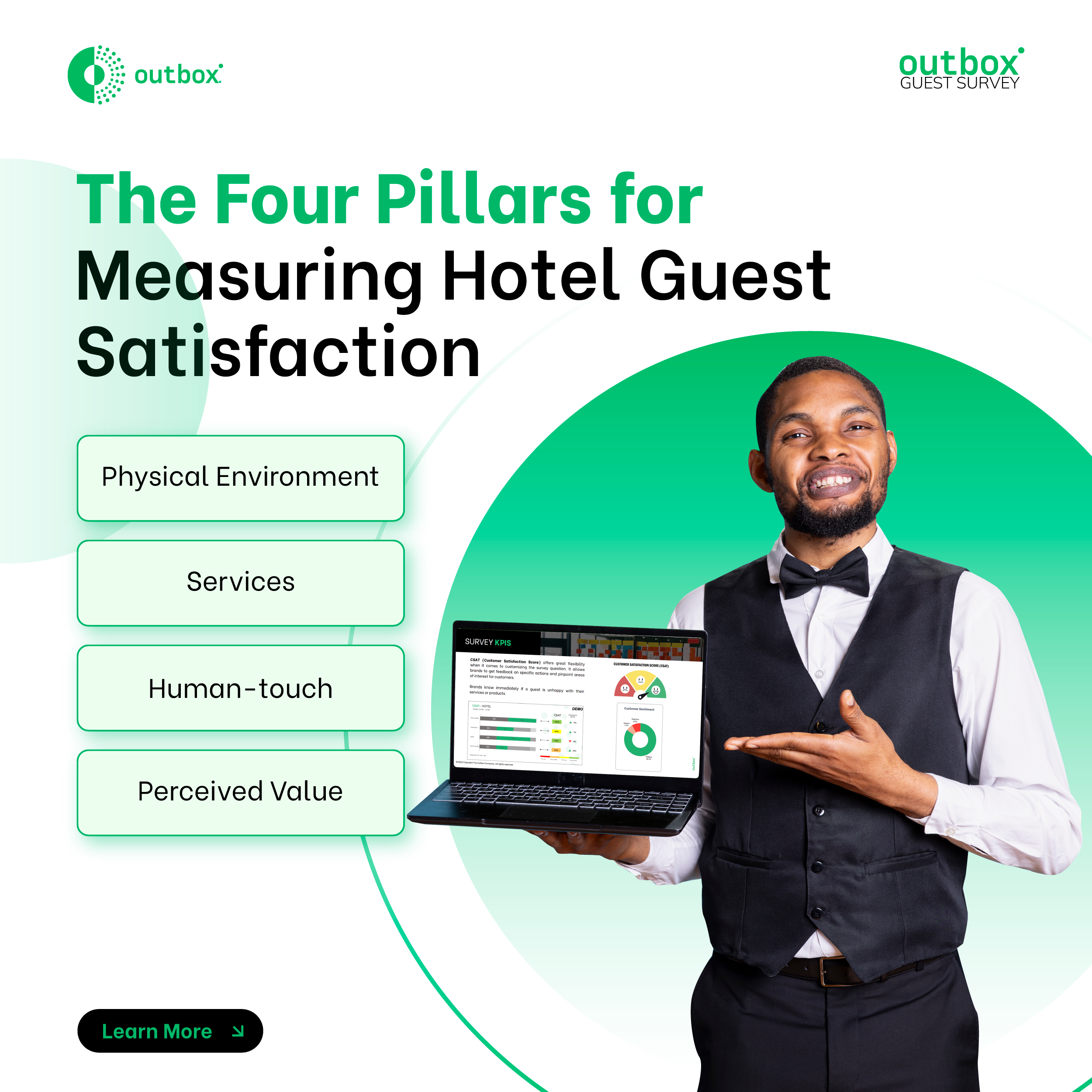In the competitive hospitality landscape, guest satisfaction is the ultimate currency. But what truly shapes a guest’s perception from the moment they arrive to the moment they check out? A memorable stay isn’t a single event but a collection of carefully orchestrated experiences. Simply measuring satisfaction isn’t enough; to truly excel, hotels must understand and optimize the core pillars that define the guest journey.
Our audit into the hotel guest experience reveals that satisfaction is built upon four fundamental pillars. By focusing on these distinct areas, hoteliers can not only meet but exceed guest expectations, turning positive feedback into lasting loyalty. Let’s explore each pillar and the key metrics that measure their success in this blog.
 1. The Physical Environment: Crafting the First Impression
1. The Physical Environment: Crafting the First Impression
A guest’s initial perception is powerfully shaped by the physical space. This is where the story of their stay begins. The tangible elements of a hotel do more than just provide shelter; they create a sense of comfort, quality, and care that lasts throughout the entire visit.
Key Factors to Evaluate:
- Design and Comfort: Are the rooms thoughtfully designed? Is the furniture comfortable and the layout intuitive?
- Hygiene and Scenery: Impeccable cleanliness is non-negotiable. This extends from the rooms to the common areas and overall landscaping of the facility.
- Overall Atmosphere: Does the hotel project a consistent and inviting ambiance that aligns with its brand promise?
The physical environment is the stage upon which the entire guest experience plays out. Getting it right ensures a strong, positive start and maintains a feeling of comfort and relaxation.
Recommended KPI: Sentiment Analysis & Guest Feedback
To truly understand how guests perceive your environment, you need to go beyond simple ratings. Analyzing the sentiment in written reviews and direct feedback provides rich, qualitative insights into what aspects of your physical space are delighting guests or causing friction.
2. Service Delivery: The Engine of Operations
If the physical environment is the stage, then service is the performance itself. The quality and efficiency of your services are the core of hotel operations. A seamless service experience demonstrates professionalism and a deep respect for a guest’s time and needs.
Key Factors to Evaluate:
- Service Availability: Are all advertised services and amenities (like Wi-Fi, pool access, or room service) readily and reliably available?
- Process Convenience: How smooth and straightforward is the check-in and check-out process? Long waits or complicated procedures can quickly sour an otherwise positive experience.
- Communication Channels: Do you offer diverse and easily accessible channels for guests to communicate their needs, from the front desk to in-room devices or mobile apps?
Flawless service delivery makes guests feel valued and cared for, assuring them they are in capable hands.
Recommended KPI: Customer Satisfaction Score (CSAT)
CSAT is the ideal metric for measuring service quality. By asking targeted questions like, “How satisfied were you with the check-in process?” you can gather specific, actionable feedback on different service touchpoints and identify exactly where improvements are needed. Brands know immediately if a guest is unhappy with their services or products.
3. The Human Touch: Building Emotional Connection
While seamless processes are vital, it is the interaction between staff and guests that creates the emotional resonance that builds true loyalty. A friendly smile, a proactive offer of help, or a skillfully resolved issue can transform a good stay into a great one. This is where a hotel’s personality shines through.
Key Factors to Evaluate:
- Staff Attitude and Behavior: Are your team members consistently welcoming, polite, and professional?
- Responsiveness: How quickly and effectively does the staff respond to guest needs and requests?
- Problem-Solving and Knowledge: When issues arise, does the staff handle them with competence and empathy? Is their professional knowledge sufficient to provide helpful information?
The human touch is what makes an experience memorable and differentiates your brand. It is the single most powerful driver in building the kind of emotional connection that brings guests back.
Recommended KPI: Net Promoter Score (NPS)
NPS measures guest loyalty by asking how likely they are to recommend your hotel to others. A high NPS score is a direct reflection of a strong emotional connection, often driven by positive human interactions. It helps you identify your most loyal promoters and understand what makes them happy.
4. Perceived Value: The “Worth It” Factor
Ultimately, satisfaction is a function of expectation versus reality. Guests are constantly making a subconscious calculation: “Is the experience I’m receiving worth the price I’m paying?” This perception of value is highly subjective but critically important.
Key Factors to Evaluate:
- Price Competitiveness: How do your service costs compare to the general market and alternative properties?
- The Feeling of “Value for Money”: Do guests feel they received a fair—or even exceptional—return on their investment? This is influenced by everything from room quality to the inclusiveness of amenities.
Communicating your brand’s value proposition clearly and consistently is essential. When guests feel they’ve made a smart choice, their satisfaction deepens, and their trust in your brand grows.
Recommended KPI: Customer Satisfaction Index (CSI)
Customer Satisfaction Index (CSI) combines the CSAT from different attributes to create a single customer satisfaction index that indicates overall customer satisfaction.
Its defining characteristic, and benefit, is its holistic, integrative nature. This means that CSI doesn’t just measure overall satisfaction. It also sheds light on which aspects of the brand offering are meeting, exceeding, or failing to meet needs.

 1. The Physical Environment: Crafting the First Impression
1. The Physical Environment: Crafting the First Impression

